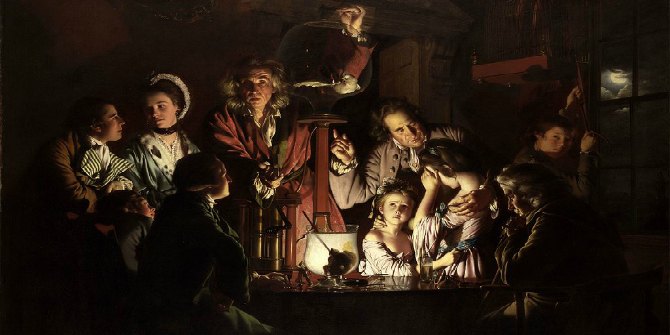Whilst much of the focus on policy impact and knowledge exchange is on what researchers need to do, there is less coverage of how much academics have done. This risks painting a picture that there is little knowledge exchange (KE) going on between researchers and policy institutions, and that it is particularly difficult to do. In this post, Sarah Foxen, Naomi Saint and Laura Webb, from Parliament’s Knowledge Exchange Unit, outline the work that researchers have done over the past two years with Parliament. Thanks to the commitment, time and efforts of these researchers, Parliament has greater access than ever before to research evidence and expertise from increasingly diverse sources, to strengthen its scrutiny of Government, debate and legislation.
Over the past few years there has been an explosion in blogs, opinion pieces and grey literature providing researchers with advice on how to engage with and have impact on political organisations. They generally state that policy engagement requires particular skills, knowledge and a specific approach, which are then explained to varying degrees. Such content is clearly useful in developing researchers’ understanding so that they can interact effectively with policy organisations. And we know that it is necessary, as research we conducted in 2017 revealed that the biggest barrier academics face to engaging with Parliament is lack of knowledge or guidance.
However, the abundance of these pieces could also give two impressions: firstly, that there can’t be much knowledge exchange (KE) going on between researchers and policy institutions, and secondly it must be very hard to do. Because if it was happening and was easy, then perhaps there wouldn’t be such a need for so much guidance.
A report published today on the KE that has gone on between Parliament and the research community over the past two years, via the Knowledge Exchange Unit, shows this is not the case. It reveals a huge amount of interactions have been taking place, illustrating that greater engagement can be achieved.
So, to change the narrative, here we don’t give advice or top tips, but rather report back to the research community their successes in working with Parliament over the past couple of years.
Upskilling and staying up to date
Over the past two years, over 1000 researchers found the time to attend training with the Knowledge Exchange Unit on engaging with Parliament and another 2000 signed up for our webinar series this autumn. Over 13,000 decided to follow us on Twitter to stay up to date with opportunities to engage with Parliament.
Connecting and exchanging
Over 250 knowledge mobilisers are now in our informal knowledge mobilisers network and are consistently promoting opportunities to engage with Parliament on our behalf. As a result, researchers from over 100 universities have contributed insights to work in Parliament in the past two years. Over 100 researchers have applied to conduct fellowships with us in the past year and 13 are already in place, with more beginning next year.
Helping us improve
To help us ensure that Parliament engages with a diverse range of researchers, 90 researchers participated in our ‘Women Researchers and the UK Parliament’ event, helping us understand how Parliament can support women researchers to engage. Recently, 81 individuals participated in four discussion groups, to help us understand the barriers for researchers from Black, Asian and ethnic minority backgrounds in engaging in Parliament, and discuss ways to overcome these.
Supporting Parliament’s work on Climate Change
In the summer, many promoted the opportunity to join Parliament’s COP26 Expert Database, and over 600 researchers signed up to it, with over 500 responding to POST’s survey around what Government and Parliament’s priorities should be for COP26, the 2021 UN Climate Change conference.
Supporting Parliament’s work on COVID-19
Finally, as the national lockdown hit in March, and over the following months where universities have been faced with possibly their biggest challenges ever, nearly 5500 researchers signed up to Parliament’s COVID-19 Outbreak Expert database, showing their willingness to make time to support Parliament’s work around the outbreak.
We’ve been able to call on experts to provide bespoke insights to over 20 committees. About 1100 experts responded to a survey seeking to understand their short-, medium- and long-term concerns. Our colleagues in POST synthesised these, to provide Parliament with 15 briefings on the most salient themes. Another 366 responded to a survey on the long-term impacts of COVID-19 to inform the work of the Lords COVID-19 Committee.
Finally, expert insights provided the foundation for Parliament’s first ever Areas of Research Interest: a list of policy issues and questions on the impacts of COVID-19, where it is likely that corresponding research will be useful for Parliament in the coming years. As a next step, and to begin to find answers to those questions, we have invited experts to share details with POST of research that can answer those questions. Nearly 200 have already done this.
Thanks
So, whilst some might think that there’s not much interaction going on between the policy and research communities, or that policy engagement is hard to do, these data show this is not the case; engagement over the past two years has been amazing. The figures that we share relate to engagement with the KEU, so it’s really only the tip of the iceberg. We know many researchers have also been engaging directly with the select committees, POST (the Parliamentary Office of Science and Technology) and Libraries too. This is not to say that we’ve ‘reached the limit’ on engagement; Parliament will always need research evidence, and we remain committed to supporting an increasingly diverse body of researchers to contribute.
We know how time poor researchers and knowledge mobilisers are, and we know that parliamentary engagement and impact is not always recognised or rewarded as it should be (though we are working to change that, as you’ll see in our report). Yet despite all that, they have stepped up, especially in response to the COVID-19 outbreak. Thanks to their commitment, time and efforts, Parliament has greater access than ever before to research evidence and expertise from increasingly diverse sources, to strengthen its scrutiny of Government, debate and legislation.
So, from the KEU, and our wider team in POST, we’d like to say a huge thank you.
Note: This article gives the views of the author, and not the position of the LSE Impact Blog, nor of the London School of Economics. Please review our comments policy if you have any concerns on posting a comment below.
Image by nugroho dwi hartawan from Pixabay








